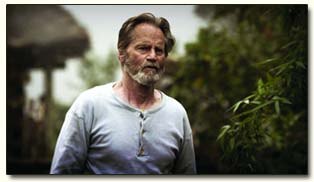|

Some actors would be terrified to play Butch Cassidy, a
character forever tied to one of cinema’s last real
icons, Paul Newman. But Sam Shepard, who plays an aging
Butch in the new “Blackthorn,” which opened Friday,
doesn’t seem in the least intimidated.
“That original movie, to me, was just two very
charismatic, entertaining movie stars, having fun,” he
explains one morning at a fashionable New York hotel.
“It had nothing to do with authenticity or history.
Butch Cassidy didn’t look anything like Paul Newman! He
was a big, lantern-jawed, stout guy. Looked like a
fullback.” No reason for Shepard not to give the part a
spin, then, especially given the movie’s conceit — that
the outlaws didn’t die in that 1908 shootout, and
Cassidy wound up raising horses for decades in the
Andes.
There are, however, shoes Shepard would refuse to step
into. “I would never try Stanley Kowalski after Brando,”
he laughs. “I mean, it’d be silly. Because it’s
definitive. Nobody can do it as good.”
Marlon Brando, of course, starred in both the original
Broadway “Streetcar” and its classic big-screen
adaptation. But when it comes to his own plays, Shepard
has given up hope of having them immortalized on the
movies. “My plays can’t be adapted for film,” he says.
“They’ve tried six or seven times, and it’s horrible!”
When asked if that applies also to the one he starred
in, 1985’s Robert Altman-directed “Fool for Love,” the
author laughs. “Yeah!”
He believes in movies as a distinct art form, though,
and wishes more people shared the sentiment. “I miss the
days when film was considered in the same breath as
painting or poetry, you know what I mean? This attitude
of the ‘auteur’: Truffaut, all those people who would
not only be the author but the director. It’s getting
rarer and rarer; it’s all corporate.
“ ‘Transformers’? I mean, what the [expletive]?” he
asks. “What has happened to film?”
Shepard accepts that he will never be one of those
writer/director auteurs. Having tried directing twice,
he says with a chuckle, “I realized I wasn’t really a
filmmaker. It’s a very, very different instinct than
theater. You have to be fascinated with the camera, and
with the technology, and I’m not. I’m fascinated by
actors, and audience, and theater predicament, but not
with the camera.”
He’s generally given up writing for the movies, too,
though he has enjoyed collaborating with German director
Wim Wenders, whom he credits with being independent
enough to guarantee scripts won’t be filtered through
myriad meddling producers.
The better of those two films, “Paris, Texas,” revolves
around a man who, like Butch Cassidy in “Blackthorn,”
fled abruptly from his life, then found himself drawn
back to it after others presumed him dead. Asked whether
that’s an appealing scenario for an actor, Shepard
pauses, and instead talks about what vanishing does for
a writer:
“James Joyce said there are three ingredients to
writing: silence, exile and cunning. Those are the three
basic elements, he said, that a writer absolutely needs
to write anything important. And the exile part of it —
I mean, they all interest me, but the exile part of it
really interests me. I’ve always felt that’s part and
parcel of extraordinary stuff. Like ‘Don Quixote,’ you
know, Cervantes. Beckett. There’s something in the exile
part of it that has power, has force.”
That’s a question one assumes Shepard has little
interest in. But any young actor out there should think
twice about accepting the part of Sam Shepard. Some
would say the definitive performance has already been
given.
|